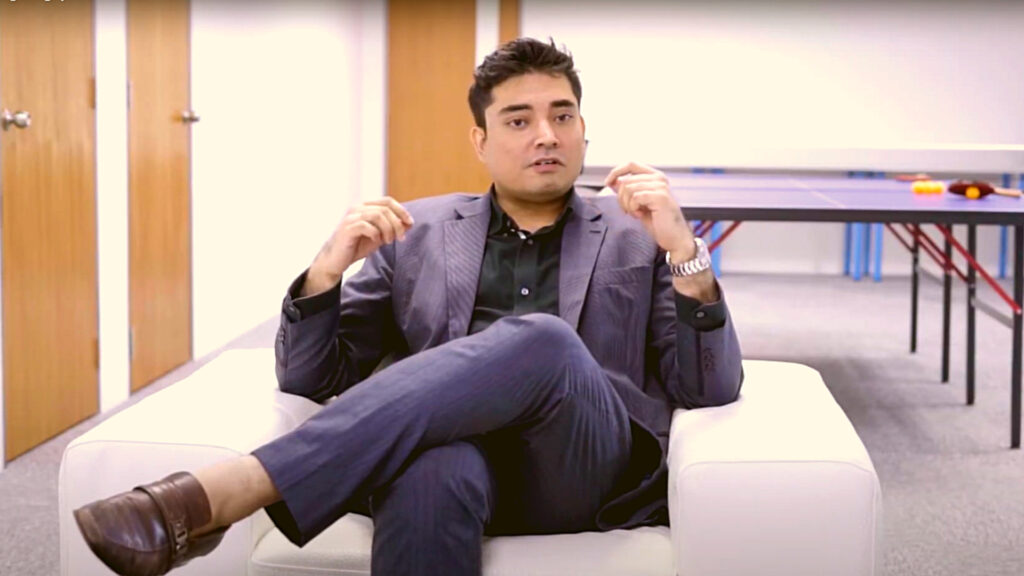Welcome to the article featuring Sancy Suraj, the CEO of the Umonics Method. Suraj is a memory expert and has developed a unique and innovative approach to learning that has benefited numerous children. In this article, we will explore Suraj’s inspiration behind the Umonics Method, the success stories of children who have gone through the program, how it differs from other memory training programs, how it tailors to individual needs, and much more.

What inspired you to create the Umonics Method, and how did you develop your innovative approach to learning?
Thank you for asking me that question. As a memory athlete, I have always been fascinated with the human memory and its potential.
Through my experience, I have come to realize the tremendous impact that memory skills can have on our lives. Therefore, I wanted to create a program that could teach young children how to develop their memory skills to help them succeed in both academic and personal life. This led to the development of The Umonics Method.
The Umonics Method is a result of years of research, experimentation, and innovation. I studied and experimented with various memory techniques, and through trial and error, I developed a method that was specifically tailored to the needs of young children. The program is based on three pillars: visualization, association, and imagination. These three pillars provide a solid foundation for the children to develop their memory skills, and I believe that they are essential for any memory training program.
The Umonics Method’s innovative approach to learning is centered around making learning fun and engaging. We understand that young children have a short attention span, and traditional teaching methods are often not effective. Therefore, we incorporate games, songs, and storytelling to create a fun and engaging learning environment that keeps the children interested and motivated. This approach has proven to be successful, and we have seen significant improvements in the memory skills of our students.
In summary, I developed The Umonics Method because I wanted to provide young children with the tools they need to develop their memory skills and achieve their full potential. Through years of research and experimentation, I developed an innovative approach to learning that is based on visualization, association, and imagination. Our program makes learning fun and engaging, and we have seen tremendous success in our students’ memory skills.
Can you share some success stories of children who have gone through the Umonics Method program and how it has benefited them in their academic and personal lives?
I would be happy to share some success stories of children who have gone through the Umonics Method program and how it has benefited them in their academic and personal lives.
One student who stands out is a boy named Ethan, who was struggling in school and had a difficult time retaining information. After joining our program, Ethan’s parents noticed a significant improvement in his memory abilities and overall academic performance. He became more confident in his abilities and was able to recall information with ease. As a result, he was able to keep up with his peers in school and even started excelling in his studies.
Another student, a young girl named Samantha, was struggling with anxiety and stress related to school. She found it challenging to cope with the pressure of exams and often struggled with test anxiety. After going through our program, Samantha was able to improve her memory skills and learn valuable techniques for managing stress and anxiety. As a result, she became more confident in her abilities, and her academic performance improved significantly.
One of our youngest students, a 4-year-old girl named Lily, had a difficult time retaining information and often forgot things her parents had told her. After joining our program, Lily’s parents noticed a remarkable improvement in her memory skills. She was able to remember important information and even started surprising her parents with her ability to recall things from the past. This newfound ability boosted her confidence and helped her feel more independent.
In addition to academic success, our program has also benefited children in their personal lives. Many of our students have reported feeling more confident and self-assured, which has helped them in social situations and their overall development. By teaching them valuable memory techniques and improving their cognitive abilities, we are equipping them with essential life skills that they can carry with them throughout their lives.
Overall, the Umonics Method has helped countless children improve their memory skills, boost their confidence, and achieve academic success. We are proud to be making a positive impact on the lives of young children and are committed to continuing to improve our program to meet their ever-evolving needs.
How does the Umonics Method differ from other memory training programs for children, and what unique benefits does it offer?
The Umonics Method is unique in that it takes a holistic approach to memory training by combining memory techniques with other important skills such as creativity, critical thinking, and problem-solving. While other memory training programs may focus solely on teaching techniques such as mnemonics or memory palaces, the Umonics Method goes beyond that to develop a child’s overall cognitive abilities.
One of the unique benefits of the Umonics Method is its focus on developing a child’s creativity. We believe that creativity is an essential skill for success in any field, and our program incorporates creative exercises and activities that help children develop their imagination and problem-solving skills. This not only benefits them academically but also prepares them for success in the future.
Another unique aspect of the Umonics Method is our focus on personalized learning. We understand that every child is unique and learns at their own pace, so our program is tailored to meet the individual needs and learning styles of each child. This personalized approach ensures that every child receives the support and guidance they need to achieve their full potential.
Finally, the Umonics Method places a strong emphasis on lifelong learning. We believe that memory training is not just a skill for academic success but a lifelong tool for personal and professional development. Our program instills a love of learning in children and equips them with the tools they need to continue learning and growing throughout their lives.
Overall, the Umonics Method is distinguished from other memory training programs by its holistic approach to learning, focus on creativity and personalized learning, and emphasis on lifelong learning. We are confident that our program offers unique benefits that can help children achieve success academically and personally.
“The Umonics Method is more than just memory training, it is a comprehensive approach to developing a child’s cognitive abilities and preparing them for lifelong success.”
In what ways do you tailor the Umonics Method to meet the individual needs of each child who participates in the program?
At the Umonics Method, we understand that every child has unique learning needs and preferences. Our program is designed to be flexible and personalized to meet the individual needs of each child who participates in it. We start by conducting an assessment of the child’s current memory capabilities, learning style, and personality. This helps us to identify their strengths and weaknesses and create a customized training plan that is tailored to their specific needs.
During the training sessions, our trainers work closely with the children to ensure that they are comfortable with the training materials and that they are able to progress at their own pace. We use a variety of teaching methods, including visual aids, interactive games, and storytelling, to make the learning experience engaging and enjoyable for the children.
We also encourage parents to be involved in the training process. We provide them with regular progress reports, feedback on their child’s strengths and weaknesses, and advice on how they can support their child’s learning at home. This allows parents to be active participants in their child’s learning journey and ensures that the child receives consistent support both at home and during training sessions.
Our trainers are also trained to adapt to the changing needs of the child as they progress through the program. As the child’s memory skills improve, the trainers will modify the training plan to provide new and more challenging exercises that build upon their existing knowledge. This approach ensures that the child is constantly challenged and motivated to continue learning and developing their memory skills.
Overall, our personalized approach to memory training allows us to cater to the unique needs of each child and ensure that they receive the support and guidance they need to achieve their full potential.
How do you ensure that the Umonics Method fosters a love of learning and a passion for knowledge in children, rather than just memorization for the sake of exams?
At Umonics Method, we believe that fostering a love of learning is essential for a child’s success and long-term academic achievement. We don’t just focus on memorization of information but rather encourage children to connect with the knowledge they are learning and develop a passion for it.
To ensure that the Umonics Method promotes a love of learning, we incorporate various techniques that go beyond mere memorization. We use visualization, storytelling, and creative learning techniques to make the learning process fun and engaging for children. By making the learning experience interactive and enjoyable, we hope to ignite their curiosity and foster a lifelong love of learning.
We also encourage children to take an active role in their own learning. Our program emphasizes self-motivation, critical thinking, and problem-solving skills. We believe that when children are given the opportunity to take ownership of their own learning and feel empowered to ask questions and explore new ideas, they are more likely to develop a love for learning that will stay with them throughout their lives.
Furthermore, we focus on teaching children skills that can be applied beyond the classroom, such as time management, organization, and goal setting. By helping children develop these skills, we aim to equip them with the tools they need to succeed academically and personally. We believe that when children see the value of these skills in their daily lives, they are more likely to appreciate the importance of learning and develop a passion for knowledge that extends beyond exams and tests.
Overall, the Umonics Method is designed to go beyond just teaching children to memorize information. We strive to help children develop a deep understanding of the material they are learning, while fostering a love of learning that will last a lifetime.
“Education is not just about filling a vessel with knowledge, but igniting a flame within that will burn bright for a lifetime.”
Suraj explains that the Umonics Method is a holistic program that emphasizes learning through multisensory experiences. The program is designed to cater to different learning styles, and it utilizes techniques such as mnemonics, visualization, and association. Suraj believes that the key to the Umonics Method’s success is in making learning fun and engaging for children. This approach has helped preschoolers to develop their memory skills, improve their focus, and enhance their confidence.
One of the Umonics Method’s success stories that Suraj shared involved a young child who had difficulty remembering basic information. After participating in the program, the child’s memory improved significantly, and he gained a newfound sense of confidence. Suraj attributes this success to the Umonics Method’s emphasis on making learning an enjoyable and exciting experience.
When asked about the challenges she has faced in promoting memory training for preschoolers, Suraj acknowledges that there is still a lack of awareness and understanding of the importance of early memory development. However, she believes that by continuing to educate parents and caregivers about the benefits of memory training, more young children can benefit from the Umonics Method.

Can you explain how the Umonics Method incorporates both traditional memorization techniques and cutting-edge brain science research?
At Umonics, we believe that a comprehensive approach to memory training is essential to achieving optimal results. Therefore, we combine traditional memorization techniques with cutting-edge brain science research to develop our program. Our goal is to create an effective and innovative system that improves memory, enhances learning, and fosters a love of knowledge in children.
Our traditional memorization techniques include the use of visual imagery, association, and repetition. We believe that these techniques are foundational to memory training, and they are also used by other memory training programs. However, what sets Umonics apart is how we incorporate cutting-edge brain science research into our program.
We understand that the brain is not a static organ but is constantly changing, and we take advantage of this neuroplasticity to develop memory training programs that are personalized to meet the unique needs of each child. For instance, research has shown that sleep is essential for memory consolidation. We have incorporated this research into our program by teaching children the importance of getting enough sleep and providing them with techniques to improve their sleep quality.
We also teach children how to use mindfulness techniques to reduce stress and anxiety, which can interfere with memory retention. In addition, we use technology such as gamification, interactive quizzes, and video lessons to make learning more engaging and interactive. These techniques have been proven to enhance learning, and they are a crucial part of the Umonics Method.
In conclusion, the Umonics Method is a unique memory training program that incorporates both traditional memorization techniques and cutting-edge brain science research. We use a personalized approach to ensure that each child’s individual needs are met, and we foster a love of learning by incorporating techniques that enhance engagement and reduce stress. Our goal is to help children develop the skills they need to succeed in academics and life, and we are confident that our program achieves this goal.
What role do parents play in supporting their child’s memory development, and how does the Umonics Method involve parents in the learning process?
Parents play a crucial role in supporting their child’s memory development, and the Umonics Method recognizes this. At the start of the program, parents are given a comprehensive understanding of the methodology and the techniques that their child will be learning. This enables them to support their child’s learning at home and become active participants in the process. The Umonics Method also provides parents with regular updates on their child’s progress, including information on their strengths and weaknesses, to help them provide tailored support to their child.
In addition to providing parents with knowledge and updates, the Umonics Method also incorporates parent-teacher conferences, where parents can discuss their child’s progress with the program’s instructors. These conferences are essential in creating a supportive learning environment, as they allow parents to gain insights into their child’s learning process and identify areas that require more attention.
Furthermore, the Umonics Method encourages parents to take an active role in their child’s learning experience by providing opportunities for them to practice the techniques and methodologies themselves. This not only helps the parents to understand the program better, but it also allows them to be better equipped to support their child’s learning at home.
Overall, the Umonics Method recognizes the important role that parents play in supporting their child’s memory development and actively involves them in the learning process. By providing parents with knowledge, updates, conferences, and practice opportunities, the Umonics Method creates a collaborative learning environment where the child, parent, and program instructors work together to support the child’s academic success.
In addition to memory training, what other skills or values does the Umonics Method aim to instill in children?
At Umonics Method, our program is designed to instill a number of skills and values in children, in addition to memory training. We believe that memory is just one aspect of a child’s overall development, and that a holistic approach is necessary for long-term success. Our program aims to develop skills and values that will serve children throughout their lives.
One of the key skills we aim to instill is critical thinking. We believe that children should not simply memorize information, but should be able to think critically about it and understand how it fits into the larger picture. To this end, we incorporate exercises and activities that encourage children to analyze and evaluate information.
Another important skill we focus on is creativity. We believe that creativity is a crucial skill for success in today’s rapidly changing world. Our program includes exercises that encourage children to think outside the box and come up with innovative solutions to problems.
We also aim to instill a love of learning in children. We believe that learning should be an enjoyable experience, and that children who enjoy learning will be more likely to continue learning throughout their lives. Our program includes activities and exercises that are designed to be engaging and fun, so that children develop a passion for learning.
In addition to these skills, we also aim to instill important values such as perseverance, self-discipline, and a strong work ethic. We believe that these values are essential for success in any area of life, and we work to help children develop them through our program.
Overall, our goal at Umonics Method is to help children develop a range of skills and values that will serve them throughout their lives. By focusing on more than just memory training, we aim to provide a well-rounded program that prepares children for success in all areas of life.
How do you see the Umonics Method evolving and expanding in the future to meet the changing needs of children and the education system?
As the education system continues to evolve, the Umonics Method must also continue to adapt and meet the changing needs of children. One of the key ways in which we are doing this is by incorporating technology into our program. We have developed an app that allows children to practice their memory skills on their own time, with personalized exercises tailored to their individual needs. This app is also a great way to track progress and see improvement over time.
Another area where we see potential for growth is in our partnerships with schools and educators. We are working to develop training programs for teachers and other education professionals, so they can implement the Umonics Method in their classrooms and help even more children benefit from our approach to learning. We also plan to offer more workshops and training sessions for parents, so they can better support their children’s memory development at home.
In terms of the Umonics Method itself, we are always looking for ways to improve and refine our program. We regularly review the latest research on memory and learning, and we are constantly experimenting with new techniques and approaches to see what works best. We also listen closely to feedback from parents and children who have gone through our program, and use this feedback to inform our approach.
Overall, our goal is to continue to be at the forefront of memory training and to provide children with the skills and tools they need to succeed in school and beyond. We believe that by continuing to innovate and adapt, we can help even more children reach their full potential and foster a lifelong love of learning.
What advice would you give to parents or educators who are interested in improving children’s memory skills but may not have access to the Umonics Method program?
Firstly, parents and educators can help children develop memory skills by creating a conducive learning environment. This means minimizing distractions and ensuring that children have a dedicated space for learning. Children should also be given opportunities to practice their memory skills regularly by engaging in activities that require them to remember information, such as playing memory games or quizzing them on what they have learned.
Secondly, children can benefit from developing good study habits, such as breaking down complex information into smaller, manageable pieces, and using visual aids to help them remember important concepts. Parents and educators can also encourage children to make connections between different pieces of information to help them remember it more effectively.
Thirdly, a healthy lifestyle can also contribute to better memory skills. Children should be encouraged to get enough sleep, eat a healthy diet, and engage in physical activity regularly. These lifestyle factors can all contribute to improved cognitive function and better memory retention.
Lastly, parents and educators can leverage technology to help children develop memory skills. There are many apps and online resources available that can help children practice their memory skills and track their progress over time. These resources can be particularly helpful for children who may not have access to formal memory training programs like the Umonics Method.
In conclusion, while the Umonics Method is a comprehensive program for memory training, there are many strategies that parents and educators can implement to help children develop strong memory skills. By creating a conducive learning environment, encouraging good study habits, promoting a healthy lifestyle, and leveraging technology, parents and educators can help children improve their memory skills and achieve academic success.
“Memory skills are essential for academic success, and as parents and educators, there are many strategies we can implement to help children develop these skills. By creating a supportive learning environment, promoting good study habits, encouraging a healthy lifestyle, and leveraging technology, we can help children improve their memory retention and reach their full potential.”
The Umonics Method is a unique program that has been developed with the objective of helping preschoolers build early memory skills. Sancy Suraj’s dedication and passion for this cause are evident in her approach to memory training. By utilizing a variety of techniques and making learning fun, the Umonics Method has helped countless preschoolers improve their memory skills, focus, and confidence. As we continue to recognize the importance of memory skills in today’s world, Suraj’s work is a reminder that it’s never too early to start building a strong foundation for learning.
















